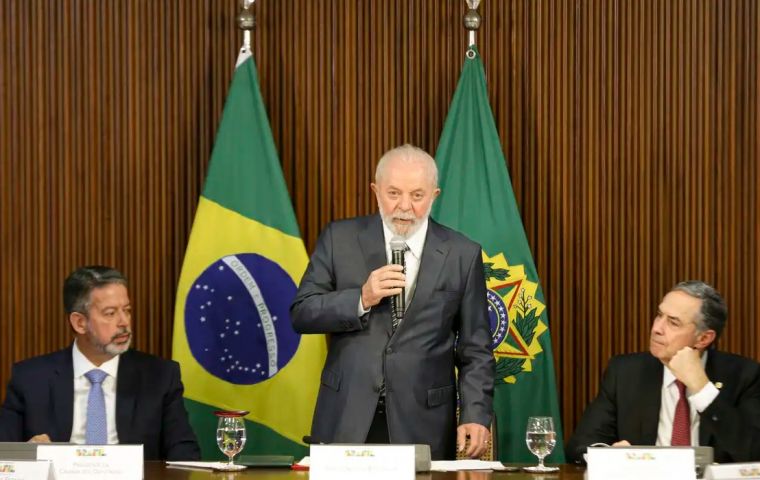MercoPress. South Atlantic News Agency
G20: Leading it is Brazil’s top global responsibility, says Lula
 Lula warned his cabinet that the G20 presidency would entail a bigger workload
Lula warned his cabinet that the G20 presidency would entail a bigger workload Brazilian President Luiz Inácio Lula da Silva Thursday launched a commission to handle the matters stemming from Brazil's pro-tempore presidency of the G20 between Dec. 1 and Nov. 30, next year, Agencia Brasil reported.
On announcing his decision at the Planalto Palace, Lula said that coordinating the largest economies was Brazil’s biggest international responsibility. He also urged his ministers not to forget, during the country’s presidency of the G20 in 2024, that the government’s priority was the management of the country itself.
“Everyone will have a lot of tasks, but it’s important that you should not forget that you were elected and appointed ministers in order to govern Brazil. Therefore, the priority is the role for which you were named as ministers. It means you will have to work more than you are already working. It means you will have to redouble your efforts so we can meet G20’s organizational needs and not drop the ball,” he said.
The Commission will be made up of representatives from all ministries, in addition to the Central Bank and the president’s Special Advisory Office, under the coordination of the Foreign Ministry and the Finance Ministry.
“It’s an arduous task. It’s the first time, and we don’t have experience. We’re going to get experience from those who have already participated in the G20,” the president said.
The G20 agenda will be defined and implemented by the Brazilian government, with direct support from G20 incumbent pro-tempore president India, and also from South Africa, who will take over next year. This system is known as troika and is what makes the group different from other international organizations, Agencia Brasil also explained.
It is the first time Brazil has assumed the presidency of the G20 since its creation in 1999. The country was a member from the beginning when the 20 largest economies in the world met to seek a solution to the bleak financial crisis that shook markets worldwide and led to the bankruptcy of a huge number of banks and companies.
Back then, the group combined finance ministers and central bank presidents only. In 2008, in a bid to tackle a new international financial crisis, it took on its current format, with heads of state and government. Today, the G20 brings together 19 of the world’s largest economies, plus the European Union. The African Union also became a permanent member during the 18th Summit of Heads of State and Government in New Delhi, India, in August.
From December this year to November 2024, Brazil is expected to organize more than 100 official meetings in various cities across the country, including 20 ministerial meetings, 50 high-level assemblies, and various side events. Chief among them will be the 19th Summit of Heads of State and Government, on Nov. 18 and 19, 2024, in Rio de Janeiro.
Brazil’s presidency of the G20 is expected to include three priorities, one of them being social inclusion and the fight against inequality, hunger, and poverty. “It is no longer humanly explainable that a world so rich, with so much money crossing the Atlantic, can have so many people still going hungry,” Lula said.
The second priority is tackling climate change, with a focus on energy transition, in addition to promoting sustainable development in its economic, social, and environmental dimensions.
Brazil is also expected to advocate the reform of global governance institutions, so they may reflect current geopolitics. Since taking office, in speeches in various international bodies, President Lula has argued that the current model of governance, created after the Second World War, no longer represents geopolitical dynamics of the 21st century. In his view, adequate representation of emerging countries is needed in bodies such as the United Nations Security Council and in financing institutions such as the World Bank and the International Monetary Fund.
The Brazilian leader also noted that the external debt of the poorest countries must be addressed. “If there isn’t a new discussion on how to bring funding to poor countries, we won’t reach a solution, the rich will remain rich, the poor will remain poor, and those who are hungry will remain hungry,” he stated.
(Source: Agencia Brasil)




Top Comments
Disclaimer & comment rulesCommenting for this story is now closed.
If you have a Facebook account, become a fan and comment on our Facebook Page!